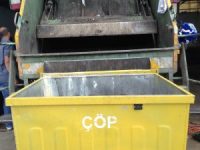
Turkish cities apply RFID to optimize waste disposal
[ad_1]
The city of Izmit, just east of Istanbul, Turkey’s largest city, is now using RFID rugged tags and mapping technology to optimize its urban waste collection and treatment methods. Izmit’s municipal solid waste department deployed RFID to create a digital map-based solution for the purpose of improving public services and improving the quality and efficiency of collection services. The solution was developed by Mobsis Teknoloji AS for Bassasoft, a Turkish technology company headquartered in Ankara and Istanbul, developing geographic information systems (GIS) and infrastructure solutions. Mobisis and Basarsoft have teamed up to create a location-based solution that uses RFID to monitor trash cans along the waste collection route to optimize waste treatment.
Xerafy Micro XII RFID tags are installed on each trash can to mark the location of the trash can on a digital map. Each smart tag is installed on the trash can with screws, electric welding or epoxy adhesive. The RFID reader is installed on the back of the garbage truck, where the garbage can is generally emptied. When the tag on the trash can is read, the system will transmit the current location information and data of the trash truck to the host server via GSM.

With this information, the Izmit Municipal Domestic Waste Department can track which garbage truck picked up each trash can in real time, which will help companies optimize the collection route. Izmit was able to build a chart of the number of trash cans to be processed. The staff can see the interval of garbage collection, the total number of all trash cans on the map, and the total number of trash cans that have been collected.
The color coding on the map shows the status of all trash cans. For example, red means that the trash can has not been dumped for more than 48 hours.
Izmit can generate reports that indicate the average capacity of each garbage truck and the historical driving route. You can also view and manage the route to determine the distance traveled by each garbage truck. After emptying the trash can, the client will receive a text message reminder.
By using smart maps and routes, companies can cut 110 kilometers of routes to 70 kilometers. By reducing the travel time on each route, 25% of fuel can be saved. The system also helps to identify areas where the number of trash cans is insufficient, so as to distribute the trash cans more reasonably.
In addition, the RFID system can also help enterprises and subcontractors manage and daily automatic process statistics, as well as provide daily notifications of trash bin inventory information and trash bin location changes.
Erinc Hason VAROL, Mobisis RFID business development manager, commented:
“I have been engaged in the RFID integrated system project for 12 years. The RFID waste treatment project in Izmit is a unique RFID solution. The cooperation between Basarsoft and Mobisis gives us the opportunity to integrate passive RFID technology with GIS technology in the system for the first time. A solution for integrating remote sensing data. We performed a large number of read and write performances of all tags on the market, and the best measured performance was the Xerafy Micro XII tag. This tag is so strong that it can still be used even after a fire in a trash can Use. It has a very long read and write distance.”
“The solution is like a smart business tool for the waste collection process. Vehicles, personnel, fuel costs, the weight of each trash can, location, these data can be managed in a simple web-based platform. Because the trash can The high-capacity, passive RFID technology seems to be the only way to manage waste. The active RFID system with sensors is nearly 10 times more expensive than our system. We initially did a pilot on four vehicles and more than 1,000 trash cans. Pilot projects. After success, we proceeded to the second stage, which was applied to 40 vehicles and more than 8,000 trash cans.”
“Basarsoft is Turkey’s largest GIS integrated software solution provider; at the same time Mobisis is Turkey’s largest AI/DC and technology solution provider. The two companies have worked together to create this unique solution.”
Metehan KAYDUL, Sales Manager of Basarsoft, said: “Basarsoft is a software solution company for digital GIS technology. We have been discussing the Izmit city project since 2013 and piloting it in 2015. The purpose of the project is to track within the scope of a web-based GIS application. The location of the trash cans, track the change and flow of the trash cans, and measure the weight of each trash can and special-spec trash cans.”
“We want to use labels that are fire-resistant, tamper-resistant, can withstand high and low temperatures, and are durable. We cannot use flammable materials, and the materials we need must be affordable. Based on these factors-plus our RFID system integration cooperation Partner Mobisis-chose Xerafy tags that can withstand high temperatures exceeding 200°. These tags are installed on the trash can, and a special computer with a read-write system is installed on the vehicle. The result is that the tag is still effective even if the trash can is on fire!”
“We know that we can expect such results, even before we started this project. But now we are very excited to see the solutions we foresee. We believe that our colleagues and customers also believe in us.”
[ad_2]



